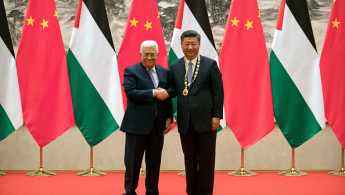Are Fatah-Hamas reconciliation talks in Beijing a waste of time?
The latest round of Fatah-Hamas reconciliation talks are due to take place in Beijing on 20-21 July, triggered in part by China's continuing push for dialogue between the factions as a means to end longstanding internal Palestinian divisions – which it sees as key to securing an ultimate resolution to the Palestinian issue.
Ahmed Majdalani, a senior member of the Palestine Liberation Organisation's (PLO) Executive Committee, said to Al-Araby Al-Jadeed, The New Arab's Arabic-language sister edition, that a two-way discussion would be held between Fatah and Hamas on 20 July. This would be followed on 21 July with a meeting for all the factions to resume the intra-Palestinian dialogue around reconciliation.
Azzam al-Ahmad, a member of the PLO's Executive Committee as well as Fatah's Central Committee, said to Anadolu Agency that his movement would "take part in the China meeting with an open mind and is serious about reaching an end to the division".
For his part, senior Hamas official Husam Badran said to Anadolu Agency that Hamas was approaching China's invitation "with a positive spirit and patriotic responsibility" as the movement was "eager to achieve national unity".
Lin Jian, a spokesperson at China's Ministry of Foreign Affairs, said in a press briefing last week that China would work with all parties in Palestine to strengthen reconciliation efforts.
He asserted that Beijing had always supported the Palestinian factions in achieving reconciliation and solidarity through dialogue and consultation, and stood ready to provide platforms and opportunities to all the Palestinian factions to carry out dialogue with the aim of reconciliation.
The most recent round of China-sponsored Fatah-Hamas talks took place in Beijing in April, but yielded no practical solutions around ending the bitter divide which has continued for around 17 years.
Likewise, Arab states have made efforts to promote a rapprochement, none of which have succeeded in bringing the divergent perspectives of the two sides together or advancing an end to the crisis.
China's efforts spring from its belief that the key to the solution to the most pressing issue today in the Middle East in the wake of the Gaza war "is achieving internal unity as a first step to paving the way towards building an independent state on the 1967 borders with East Jerusalem as its capital," said Lin Wei, a researcher at the Jiangxi Institute of Political Studies in China.
He said Beijing realizes that continuing Palestinian division has become a cover for the continuation of the Israeli killing machine in Gaza.
"Despite the depth of the divide, China is acting as a responsible state and is banking on its capability to influence the relevant parties, as it enjoys strong relations with all Palestinian factions, including Hamas and Fatah", he said.
He also pointed out that China "knows well it won't be easy to reap the fruits of these efforts through just one or two sessions, due to the differing approaches every side takes with regards to resolving the Palestinian issue", in reference to the peace process versus armed resistance.
But Li Yang, a professor at Tseung Kwan Institute of Studies and Research (based in Hong Kong), believes Beijing's decision to host a new round of talks, despite the failure of all previous rounds over a decade and a half, is futile and doomed to failure.
He says there is no doubt Beijing has its own aims - linked to promoting its image on the world stage as a sponsor of peace, after failing to achieve any breakthrough in the Ukrainian crisis.
Yang pointed out that China had intensified its efforts regarding Palestinian reconciliation and started up the Fatah-Hamas talks after its successful mediation between Tehran and Riyadh in March 2023.
He thinks this is because it hopes to secure more breakthroughs and play a greater role in solving the crises of the Middle East in a way that will serve its strategic interests in the region.
However, he believes China's approach to the Palestinian issue and Fatah-Hamas reconciliation is marred by many weaknesses that prevent it from being able to replicate its experience in the Saudi-Iranian issue.
In his view, the biggest obstacle is ignoring the pivotal role of the US in this issue, due to the direct and powerful influence it wields over all parties to the conflict, including Israel and the Palestinian Authority itself, led by Fatah.
This is an edited translation from our Arabic edition. To read the original article click here.
Translated by Rose Chacko




 Follow the Middle East's top stories in English at The New Arab on Google News
Follow the Middle East's top stories in English at The New Arab on Google News

![A group of Palestinians, foreign and Israeli activists gather to participated in an olive picking event on the land in the town of Battir, which is under threat of confiscation by Israel in Bethlehem, occupied West Bank on 8 November 2024. [Getty]](/sites/default/files/styles/image_330x185/public/2182930803.jpeg?h=199d8c1f&itok=__0LgGsa)
